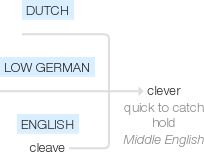Clever
Middle English (in the sense ‘quick to catch hold’, only recorded in this period): perhaps of Dutch or Low German origin, and related to cleave2. In the late 16th century the term came to mean (probably through dialect use) ‘manually skilful’; the sense ‘possessing mental agility’ dates from the early 18th century.
wiktionary
From East Anglian dialectal English cliver(“expert at seizing”), from Middle English cliver(“tenacious”), perhaps from Old English *clifer, clibbor(“clinging”), or perhaps from East Frisian (compare Saterland Frisian kluftich), or dialectal Norwegian klover(“ready, skillful”); possibly influenced by Old English clifer(“claw, hand”). [1] Related to cleave. Perhaps influenced by Welsh celfydd(“talented, dexterous, expert”).
etymonline
clever (adj.)
1580s, "handy, dexterous, having special manual ability," apparently from East Anglian dialectal cliver "expert at seizing," perhaps from East Frisian klüfer "skillful," or Norwegian dialectic klover "ready, skillful," and perhaps influenced by Old English clifer "claw, hand" (early usages seem to refer to dexterity). Or perhaps akin to Old Norse kleyfr "easy to split," from Proto-Germanic *klaubri‑ from PIE root *gleubh- "to tear apart, cleave." Extension to intellect is first recorded 1704.
This is a low word, scarcely ever used but in burlesque or conversation; and applied to any thing a man likes, without a settled meaning. [Johnson, 1755]
The meaning has narrowed since, but clever also often in old use and dialect meant "well-shaped, attractive-looking" and in late 18c. and 19c. American English sometimes "good-natured, agreeable." Related: Cleverly; cleverness.
